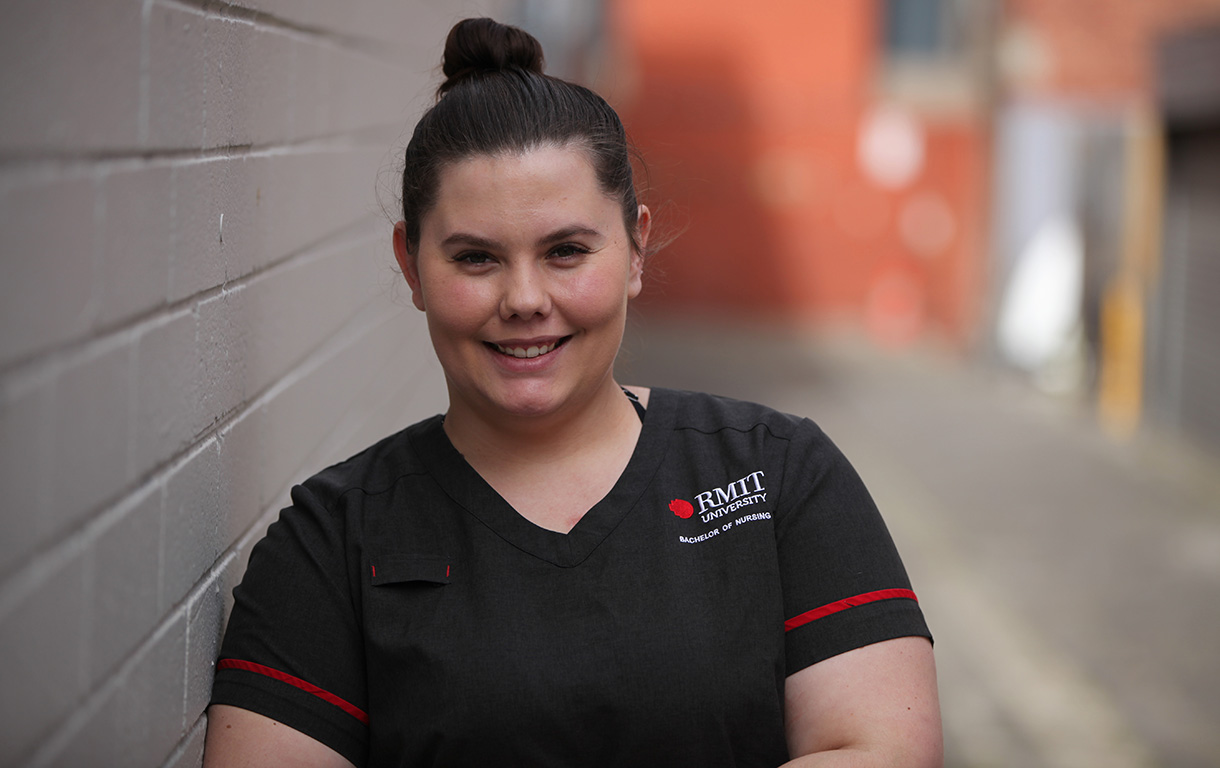Elizabeth Jones always admired nurses and the work they do. With the help of RMIT pathways, she has been able to start a career she loves in a field she’s passionate about.
I'm from Darwin, out near Palmerston, up in the Top End. When I left school, I got a job in a hardware store. After about three years, I decided to come down to Melbourne and managed to get a transfer with my job.
I always wanted to get a job in the care field. When I was younger I was always really impressed by nurses. They were smart. They handled themselves really well in any situation, and they had a real pride in their career.
 Elizabeth Jones - Bachelor of Nursing
Elizabeth Jones - Bachelor of Nursing
I always wanted to be able to come home from what I was doing and feel good about what I’d done that day. I’ve always been fascinated about how the body works, so when someone mentioned I should do a nursing degree, I wasn’t sure at first. I wasn’t from an academic family – my parents didn’t go to uni, neither did any of my brothers.
I looked into it and someone at RMIT said I could start with a Certificate III in Individual Support and if I liked it, it would provide a pathway into a nursing degree.
I loved the course.
The teachers were amazing. It was a six month course and they taught us all sorts of things about caring for aging patients. We learned a lot about the sorts of ailments older people get, like dementia, a lot of the diseases they’re particularly likely to get, and how to care for them so they don’t get sick.

Pressure Injury Care - Get the RMIT Know-How
Pressure injuries are a real issue for the health of older people, like residents in aged care homes. Lying too long in one position can restrict blood flow and cause injuries to the skin and infections.
Like using a slide sheet to help people who are stuck in bed and can’t move themselves move to more comfortable positions. We were trained in how to lift people without straining your back and how to use lifting equipment.
It was incredible to see how valued the skills we learned in the course were. They’re so good, a lot of my classmates were getting job offers straight off the back of getting a Certificate III.
But I wanted to go further. I really wanted to get into emergency nursing and critical care. That meant enrolling into a Diploma of Nursing at RMIT, which made me an Enrolled Nurse. That was 18 months of training and covered all aspects of general nursing; wound care, CPR, administering medication, calculating how much medicine to give patients based on weight and size.
By then I had got my teeth into this whole nursing thing and really wanted to get into critical care, so I enrolled in my Bachelor of Nursing. I got credits for the courses and Diplomas I had already done. This is when you start to specialise, get higher level training, learn how to administer Schedule 8 drugs, and I got to meet some truly amazing people.
I have now graduated as a Registered Nurse - something I thought wouldn’t have been possible years ago.
From here, I can get work in Emergency Departments and in critical care wards at general and specialised hospitals. I want to go on and do a postgraduate qualification in Emergency Nursing and become a Nurse Supervisor in an Emergency Room, and we’ll see where we go from there.
I love what I do, and I love being able to get home at night and feel proud about what I did.
I care for my career. Because I have RMIT know how.